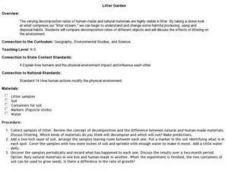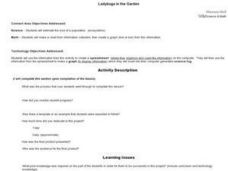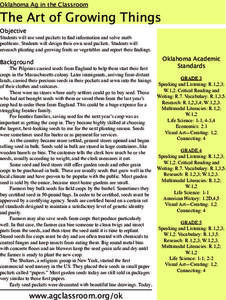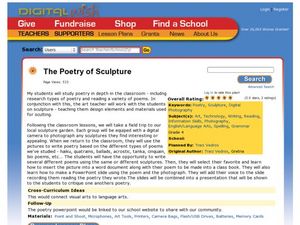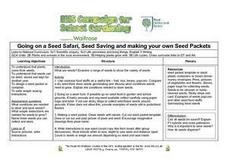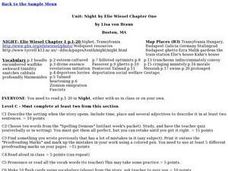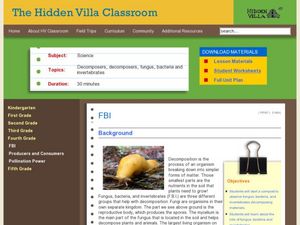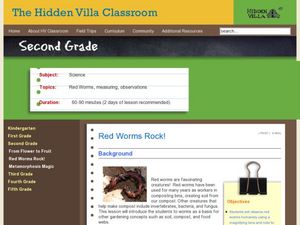Curated OER
I Love the Earth
In this coloring learning exercise, students color in an illustration titled "I Love the Earth." The picture shows an angel watering a flower garden with hearts.
Curated OER
Grow Your Own
Students study the growth and care of plants. They take tour of their school site and plant seeds to observe their growth. Afterward, they answer questions about the origin and value of their plants.
Curated OER
Bringing Illinois into the Curriculum
Students of all ages are introduced to the geography of Illinois. Depending on the grade level, they participate in different activities which allow them to discover Illinois in the past and present. They examine the animals and...
Curated OER
Litter Garden
Young scholars discuss what man-made and natural materials are visible in litter. Using a sample of litter, they review the concept of decomposition between the two types of materials. They examine the two samples once and a while and...
Curated OER
Ladybugs in the Garden
Fifth graders estimate the size a population (ecosystems) Students make a chart from information collected then create a graph (line or bar) from this information. Students do a lesson where they observed, examine, and record data...
Curated OER
What Are Heritage Plants?
Students listen to a story, plant seeds, and study about heritage seeds. They read seed packages for plant needs and sizes, plant seeds. They read story "How Groundhog's Garden Grew" which covers many activities of planting, growing...
Curated OER
The Art of Growing Things
Students discuss how the Pilgrims brought seeds, from England, into the new settlements and explore the history of seed nurseries. After observing packets of seeds and their contents, students list information found on the packets and...
Curated OER
The Poetry of Sculpture
Fourth graders practice writing poetry while examining all types of art. In this art analysis lesson, 4th graders participate in a field trip to a sculpture garden in which they view sculptures and create different forms of poetry...
Curated OER
Going on a Seed Safari
Students describe biology by identifying different plants in class. In this seed lesson, students discuss the process of how a plant grows from seed to leaves. Students attend a field trip to their garden or another park and collect a...
Curated OER
Water Saving
Water conservation and management is the focus of this lesson plan. Students identify the need for being "water wise" in society through research and discussion. and present their findings in many different formats (short story, poetry,...
Curated OER
Night by Elie Wiesel Chapter One
Students participate in a layered curriculum unit with varied difficulty activities like this one: Write a brief narrative (300 words) Discuss your answers to the following questions: What do you know about the Holocaust? Where did you...
Curated OER
4th Grade Food Safety Lesson
From a high-speed hand-washing lesson to identifying important nutrients in fruits and veggies, this resource has several activity ideas and worksheets for teaching food safety to your learners.
Curated OER
Color Your World with Changes --- the Camouflage Game
Seventh graders, after predicting dominant colors foud in their habitat or garden, visit heir area on a monthly basis. They search for colored toothpicks, then graph the results, determining the dominant color for the month.
Curated OER
FBI
Fourth graders experiment with compost. In this Science lesson plan, 4th graders begin a worm compost as well as an outdoor compost. Students discuss decomposition.
Curated OER
It's Just Dirt
Students discover how seed germination varies according to the soil type. In this soil science lesson, students discuss what plants need in order to grow and investigate various types of soil. Students use their senses to describe each...
Curated OER
Social Studies: Getting to Know You
Students in kindergarten and college students engage in dialogue designed to help them get to know each other. They meet at three discussion centers, where the students express what makes them happy, how they are seen, and how they are...
Curated OER
If the Forests Could TAlk
Third graders research insects using the internet sites provided. They research the role of insects as pollinators for plants, and the impact they have on our ecosystem. They participate in various activities/centers utilizing the facts...
Curated OER
Bird Brilliance!
First graders explore natural resources and search outdoors to find materials to create a bird's nest. In this bird's natural resources lesson, 1st graders listen to a book about birds and reflect on the various things birds use to...
Ford's Theatre
How Perspective Shapes Understanding of History
The Boston Massacre may be an iconic event in American history, but perhaps the British soldiers had another point of view. Using primary sources, including reports from Boston newspapers and secondary sources from the British...
Curated OER
Our Natural Resources
Your class will learn about natural resources and man-made items and differentiate between them. They chart resources from seven pictures and explain how each natural resource is used.
Curated OER
Red Worms Rock!
Second graders measure red worms. In this lesson, 2nd graders observe and collect data on red worms. Students measure the red worms and create a graph with the data they collect.
Northern Ireland Curriculum
Me Inc.
Build your learners' self-esteem with a series of lessons that focuses on their identity and observation of the world around them. Applicable to many different subjects and lessons, the resources guide kids through the process of...
NOAA
Community Ecology and Sampling
Seamounts in the Coral and Tasman Seas are home to more than 850 different species. Groups explore hydrothermal vents, researching the organisms found there and their energy source. They also learn about seamounts, exploring their unique...
West Corporation
Making Inferences – Use Your Mind to Read!
How can you tell if someone is happy? The lesson works with elementary and middle school scholars to activate their schema and pay attention to details to make inferences in their daily lives, poetry, and other literature. Cleverly...





